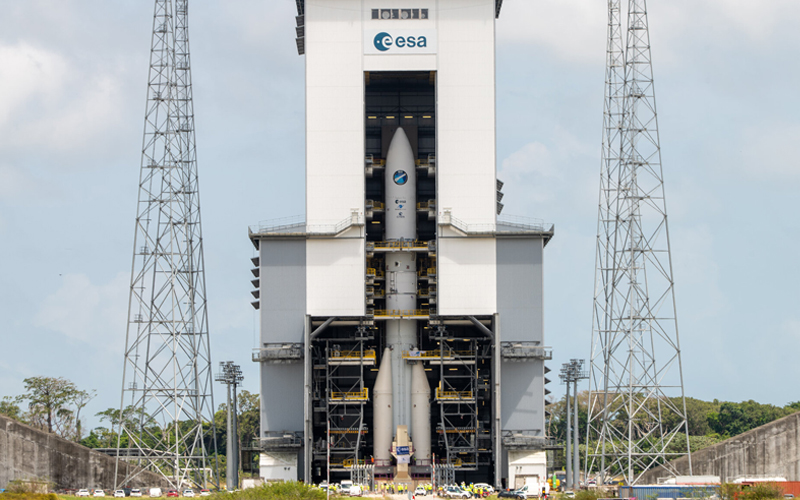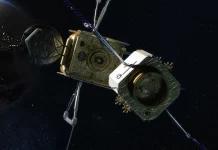
ESA-Manuel Pedoussaut
The head of the French space agency CNES, Philippe Baptiste, identified a complex governance structure and ESA’s geographic return rule as the primary reasons why the development of Ariane 6 has failed to meet projected deadlines and price targets.
In a revealing interview with French financial news outlet Les Echos, Baptiste argued that while ArianeGroup was given a greater role in the development of Ariane 6, they were not given “the necessary autonomy and responsibilities.”
“Far too many decisions go back to the ESA level, but these decisions are taken according to the “one country, one vote” principle, which is not at all suitable for leading a project as complex as the development of a launcher,” Baptiste said. “We have therefore not moved from a public model to a private model, but to a hybrid system and, objectively, the governance of Ariane 6 is less good than that before, which is also the main cause of delays of the new launcher.”
The structure created to manage the development and operation of Ariane 6 was something completely new for Europe. The development of Ariane 1 to 5 was primarily led by CNES, with the agency making all technical decisions and supervising the entire programme. With Ariane 6, ArianeGroup became the design authority for the launcher, CNES the design authority for the launch pad, and ESA the overall authority.
This was, however, by design. When ArianeGroup proposed its joint proposal in June 2014, it asked for a public/private partnership. This allowed ArianeGroup to assume all design, development, and operational responsibility, with the majority of the financial responsibility being shouldered by ESA. Baptiste appears now to be suggesting that ESA should have funded the development of Ariane 6 without any involvement or control. The CNES boss also pointed to the fact that SpaceX is “subsidized” by the US government while still being fully autonomous as proof that this arrangement occurs elsewhere in the world. What he omits, however, is that SpaceX is given lucrative launch contracts, yes, but the company was never given billions of dollars to simply develop its launch vehicle. It has also not requested nor been given a yearly cash subsidy to simply operate Falcon 9 as ArianeGroup has for Ariane 6.
In addition to the governance structure implemented to manage the development of Ariane 6, Baptiste also took aim at ESA’s geographic return rule. The rule ensures that any country that contributes funding to the development of a programme receives the value of its contributions back in contracts awarded to industrial manufacturers from that country. Baptiste argued that the rule ensured that ArianeGroup had “no room to maneuver in choosing its suppliers and negotiating prices.”
“But in the industrial and commercial field, the speed of development and competitiveness are key, and this proves incompatible with the fragmentation linked to geographical return, which results in a fragmentation of responsibilities,” Baptiste said. “We waste time, and suppliers have little incentive to lower their prices.”
In a startling revelation, Baptiste pointed to one “large subcontractor” in particular “from a neighboring country” that he says is “demanding price increases of nearly 60% from ArianeGroup, while the same country’s space agency vehemently criticizes the cost of the programme.”
France neighbours Spain, Belgium, Switzerland, Germany, and Italy. There are subcontractors from all five countries working on Ariane 6. However, considering the size of the contributions of each country, large Ariane 6 contractors are probably limited to Germany and Italy. As far as I know, neither ASI nor DLR has openly criticized the price of Ariane 6, but the bad blood between France and Italy when it comes to their respective launcher programmes has been well documented. And the only Ariane 6 subcontractor of note from Italy is, of course, Avio. The company is contracted to contribute to a number of Ariane 6 systems but is most notable for its contributions to the development and production of the P120C solid boosters through a joint partnership with ArianeGroup called Europropulsion. This is far from confirmed, but it is possible that this is the subcontractor Baptiste was referring to.
When ESA member states agreed to fund the Airbus/Safran Ariane 6 proposal in December 2016, the agency and European governments agreed to purchase a minimum of five launches per year to support the endeavour. However, according to Baptiste, this agreement was not to continue indefinitely. Baptiste identified this contractual element as one of the reasons that ArianeGroup is asking for yearly subsidies from ESA member states to operate Ariane 6.
“It cannot be denied that conditions have evolved. Introductory prices fall, wages and raw material prices rise. They underestimated the problem of controlling their industrial chain at the start. Finally, the contract has a structural problem. It only commits States for the first fifteen launches and does not provide for anything beyond that.”
ArianeGroup and ESA have maintained that Ariane 6 will cost sustainably less than Ariane 5 per flight. The figure most prominently cited is between 40 and 50% less. However, Baptiste appeared to indicate that the cost reduction is unlikely to be as significant as was initially projected.
“The competition will be tough for Ariane, but what we are sure of is that Ariane 6 technically meets the needs of the market, as shown by its overflowing order book, even before the first flight,” Baptiste said. “Ariane 6 will also cost less than Ariane 5, even if we would have liked it to cost much less.”
Baptiste chose to sit for the Los Echos interview the week before the ESA Space Summit, at which the future of European launch will be discussed, is not an accident. France has for decades maintained control over the European launch sector, but that control is being threatened. Private companies within the UK, Spain, Germany, and Italy are all developing launch solutions outside of the control of France and Arianespace. And with the failures of Ariane 6 continuing to be felt, it’s not ridiculous to assume that ESA may entertain proposals from outside French borders for what comes next.




